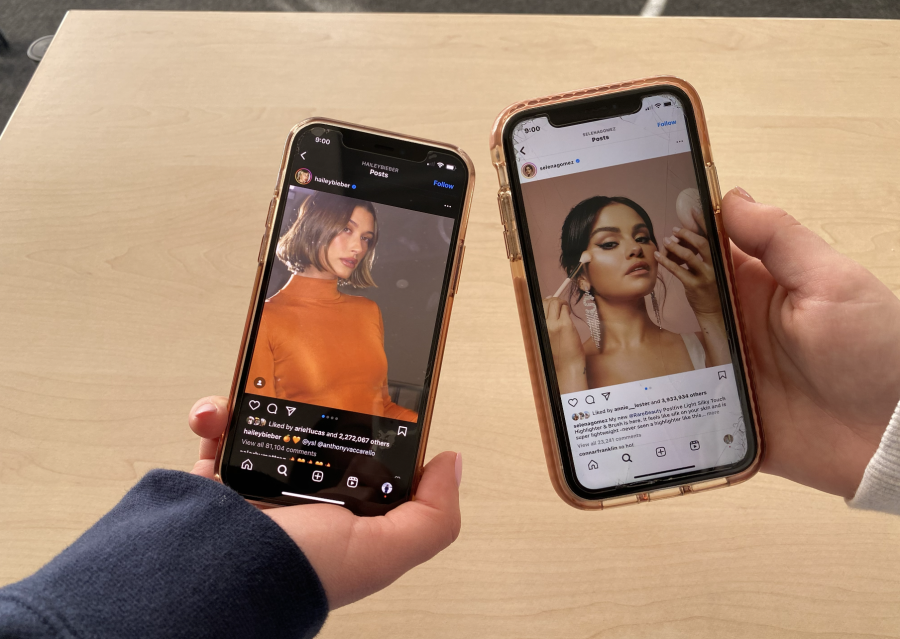Dear internet, stop pitting women against each other
The Catalyst / Mia Muzzi
Drama between celebrities forces people to unfairly compare women to each other, especially on social media.
With the popularity of social media and the overall climate of the digital age, apps such as Instagram and TikTok are controlling people’s lives. Subconsciously, women tend to compete against each other by comparing Instagram follower counts, vacation destinations and, most significantly, looks. This mindset is only further perpetuated by the rivalries that fans and social media users set between female celebrities.
People tend to grasp at straws to search for drama in the sea of social media posts and tweets shared by celebrities. One prominent example today includes the current alleged feud between Selena Gomez, Hailey Bieber, and Kylie Jenner, where people suggested that Jenner and Bieber posted selfies on an Instagram story mocking Gomez’s eyebrows. This has resulted in Jenner losing millions of followers and the pre-existing hate towards Bieber hitting an all-time high, with more love and appreciation being given to Gomez.
“Social media often creates rivalries between women and works up a scenario to be larger than it is,” said senior Clarissa Wing. “We see this much more with women than men. Selena Gomez’s fans have reached a point where they have decided to destroy Hailey Bieber’s reputation, which I would assume is not something Selena wants. Instead of leaving room for apologies or growth from wrongdoings, the media continues to make the situation worse.”
In response to the drama surrounding her relationship with Bieber, Gomez highlights the importance of spreading kindness. There is a recurring trend of hateful relationships being created between notable women by manipulating social media content. This only perpetuates the idea that society is pitting women against each other for the sole purpose of hatred and gossip, especially over something as trivial as physical appearance.
These sorts of feuds are also created and manipulated between female artists in the music industry. Through her hit album “Sour,” Olivia Rodrigo touched many fans with her relatable messages about teen angst and insecurity. While many have suspected that she is singing about heartbreak from her past relationship with actor and singer Joshua Bassett, they have pointed fingers toward Sabrina Carpenter, who allegedly had a relationship with Bassett as well. This love triangle caused some speculation that Carpenter was a “homewrecker” who interfered in their relationship, which left her receiving death threats and being repeatedly criticized by the public.
When Rodrigo’s fans villainized Carpenter in this way, they were giving a clear representation of the negative way that women interact with each other via social media. This is especially concerning when this backlash stems from rumors and gossip based on interpretations of song lyrics and social media posts, as it demonstrates the weight that social media carries in affecting celebrities’ reputations and public approval.
“The sad fate for women in the media is that it’s always about competition,” said Dance teacher Coleen Lorenz. “It’s especially prevalent in purchasing and buying. Sellers advertise through comparing women. It impacts our young girls and women through these harmful representations of women. It makes younger girls feel like they are not enough.”
Female and male celebrities are frequently antagonized on social media platforms, but men’s experience when dealing with these types of issues rarely compares to the degree that female celebrities must cope with. Women are constantly appearing on social media pages and being portrayed as dramatic or mean, when this might not be the case at all. This results in a negative misrepresentation of women altogether and implies that they attract scandal. This is very untrue, and when a young girl who is very impressionable only sees women being involved in drama and being pitted against one another, they begin to lose belief in the principle of “girl power.”
While people most commonly see this idea of pitting women against each other on social media, it happens both on and off the internet. In order to advance feminism and stand up for women, rather than tear them down, this needs to be reflected on social media as these portrayals of women are toxic and unrealistic.

Ava Marinos is a senior at NDB and is excited for her third year with The Catalyst. She actively participated in the club as a sophomore and junior and...

Mia Muzzi graduated NDB after four years working for The Catalyst. She spent her freshman year as a Staff Writer, then during her sophomore year worked...




